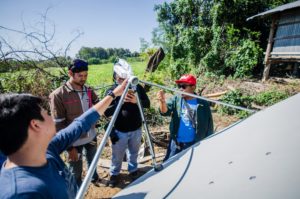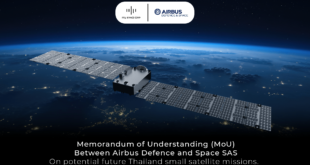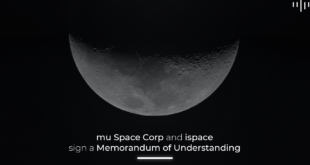
Thailand’s mu Space has announced that it has secured an orbital slot and spectrum for its proposed communications satellite, planned for launch in 2020 by Jeff Bezos’ Blue Origin. The mu Space satellite is expected to provide satellite broadband throughout Southeast Asia.
Mu Space Corp has been granted the use of satellite spectrum at the 50.5 degrees East orbital position, a spectrum previously operated by New Skies Satellites (NSS), to provide services for six countries in the region. The company hopes to launch commercial satellite broadband as well as mobile and broadcasting solutions for governments, telecom companies, and businesses outside Thailand by the end of this year, providing service to Cambodia, Laos, Malaysia, Myanmar, Vietnam, as well as Thailand.
According to James Yenbamroong, chief executive and founder of mu Space, this move is a significant step, enabling the company to expand its satellite-based business outside Thailand.
Last year, mu Space partnered with SES to deliver its services to rural communities in Thailand. Under the agreement, mu Space would contract satellite capacity on SES-8 and SES-12 to provide satellite-based services via the 95 degrees East orbital slot in space.
Yenbamroong told the Bangkok Post that mu Space is leasing the satellite spectrum from SES to provide service on the 50.5 degrees East orbital slot for 15 years, with an option to extend for another 15 years. “The satellite spectrum capacity will enhance mu Space’s existing capacity for long-term business,” he said.
The Bangkok Post reports that mu Space is negotiating with several prospective partners in the six countries, each of which holds landing rights for satellite downlink, to provide services.
The company plans to launch its own high throughput and low latency geosynchronous earth orbit satellite in 2020 using Blue Origin’s New Glenn space vehicle; this satellite will be designed for a. Yenbamroong is quoted as saying that when mu Space’s own satellite is launched, it will replace the position currently operated by NSS.
Yenbamroong explained that the details of the operations contract for the SES-8 and SES-12 satellites is different from those for NSS-5. The contract for satellite capacity on SES-8 and SES-12 is for five years, with the option to extend for another five years, while the satellite capacity on the NSS-5 contract has 15 years, with option to extend for another 15 years. “The contract for satellite capacity on NSS-5 is more flexible and could generate benefits for mu Space’s long-term road map,” Yenbamroong said.
Founded in June of 2017, last year, mu Space is developing business in digital parks and space tourism, in addition to its satellite program.





